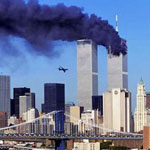Twelve years have passed since the terrorist attacks on New York and Washington.
Those who can remember can’t help but remember where they were and what they were doing when they learnt the terrible news. It’s one of those epochal moments.
Wars have been waged in the wake of the attack, and recent events in Syria demonstrate the ongoing tumult in the Middle East. But it’s not only the political and strategic ramifications which imbue September 11 with its significance. It still looms large, and it’s still immediate in some sense, because of the sheer human tragedy. The images of people falling to their death is something I’ll never forget.
Apart from that, the attack in New York — like the attack at the Boston Marathon — shocks us because it’s unusually relatable, in contrast to terrorist attacks in Baghdad and Kabul which are easily categorised as “somewhere else.” (Michael Cook has a thoughtful piece on this hairy topic.)
I still remember the shock I received when the footage I was watching on TV — which I presumed was Tel Aviv or Jerusalem — was revealed to be New York City. A thought quickly formulates: this could have happened to me. What would I have done?
Maybe that’s why this book extract is so compelling:
When the first plane hit the north tower of the World Trade Center, Marissa Panigrosso was on the ninety-eighth floor of the south tower, talking to two of her co-workers. She felt the explosion as much as heard it. A blast of hot air hit her face, as if an oven door had just been opened. A wave of anxiety swept through the office. Marissa Panigrosso didn’t pause to turn off her computer, or even to pick up her purse. She walked to the nearest emergency exit and left the building.
Others in Marissa’s office ignored the fire alarm, and also what they saw happening 131 feet away in the north tower. Some of them went into a meeting. A friend of Marissa’s, a woman named Tamitha Freeman, turned back after walking down several flights of stairs.
“Tamitha says, ‘I have to go back for my baby pictures,’ and then she never made it out.”
Research has shown that, when a fire alarm rings, people do not act immediately. They talk to each other, and they try to work out what is going on. They stand around.
The extract comes from The Examined Life, which is a psychoanalyst’s take on human foibles and habits, what strengthens us and what weakens us. I’m not a great fan of psychoanalysis, which strikes me as something of an unfalsifiable pseudoscience, but I’m interested enough to buy the book.
You can read the full six minute extract at Medium. Medium, incidentally, is an eclectic collection of good writing. You might also like Medium‘s 9-11 section.
DJ Pangburn’s This is your JFK assassination . . . this is your Pearl Harbor is especially interesting to me, because like him I was in my second year at university, and where he trudged, in shock, to a class on American politics, I trudged, in shock, to a class on post-Soviet Russian politics. Unlike Pangburn, though, I resist the righteous self-congratulations which mars his essay. I like to think I do, anyway (he wrote in righteous self-congratulations).






Recent Comments